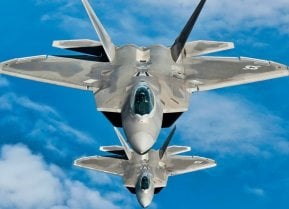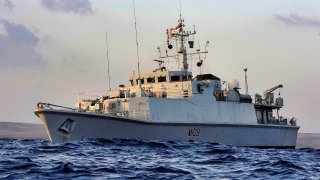Turkey Won't Allow UK Minehunters into the Black Sea
At issue is the fact that NATO ally Turkey has refused to allow the two vessels to enter the Black Sea, citing the Montreux Convention.
In late 2023, the UK and Norway announced that the two NATO partners would band together and help bolster Ukraine's navy by supplying Kyiv with two mine-hunting ships, along with 20 Viking amphibious armored vehicles – which could be deployed rapidly by helicopter or landing craft – and 23 coastal raiding boats that could be employed to land detachments of troops or serve as a firing platform for heavy machine guns.
U.K. Defense Secretary Grant Shapps and Norwegian Defense Minister Bjorn Arild Gram announced the formation of a maritime capability coalition during a news conference in London in December and said they expected other nations to join soon, making it a "truly global affair."
"Securing the seas is the only way to defeat a tyrant like Putin, to guarantee the long-term independence and prosperity for Ukraine and for the whole of Europe," Shapps said at the news conference, per The Associated Press.
Moreover, the new coalition announced that it would work with Ukraine to expand its forces in the Black Sea, and to further develop a Ukrainian Marine Corps as well as enhance the use of river patrol craft to defend inland and coastal waterways.
The Sandown-class Minesweepers
The UK's Royal Navy has been the primary operator of the Sandown- class minehunters.
The vessels first entered service in 1989 and a total of 15 have been built. Currently, 13 remain in service with three transferred to Estonia, another three transferred to the Royal Saudi Navy, and two being transferred to Romania. One has been laid up, while another is employed as a static training vessel.
The remaining two have been transferred to Ukraine, but it isn't clear when they could actually be supplied to aid Kyiv.
The former Sandown-class minehunters are 52.5m long and displace 485 tonnes. The ships have a range of more than 2,500 nautical miles without refueling. The minehunters employ high-definition sonar to scour the world's sea beds for mines and lost explosives, which are then safely destroyed by the ship’s clearance diving teams or the ATLAS Seafox mine disposal system.
Turkey Blocking the Transfer
At issue is the fact that NATO ally Turkey has refused to allow the two vessels to enter the Black Sea, citing the Montreux Convention.
"The Montreux Convention guarantees stability in the Black Sea and it is strictly observed. The minehunter vessels that the UK has handed over to Ukraine will not be able to enter the Black Sea until <...> [the Russia-Ukraine conflict] is over. The United Kingdom was informed about that earlier and there have been no further inquiries on the matter," a source in the Turkish Defense Ministry told the IHA News Agency this week.
Under the 1936 treaty, Turkey has the right to close the Turkish straits to the Black Sea. Though ships of non-belligerent countries, which in this case would be any country that is not Ukraine or Russia, can sail into the Black Sea during wartime, the Montreux Convention ultimately leaves the decision on whether warships can pass through the waters to Turkey, notably if Ankara fears it could be pulled into the war.
Turkey announced early on in the Russian invasion of Ukraine that it would not allow non-Black Sea nations to sail through the straits.
"Our pertinent allies have been duly apprised that the mine-hunting ships donated to Ukraine by the United Kingdom will not be allowed to pass through the Turkish Straits to the Black Sea as long as the war continues," the Turkish directorate of communications also said in a statement, USNI News reported.
Ankara's decision has received criticism from many within NATO, who claim that Turkey isn't taking a strong stance against Russia.
"To my eye, Ankara is trying too hard to strike a balance and should fully lean into its role as a NATO member," Retired U.S. Admiral James Stavridis, who served as the defense alliance's former Supreme Allied Commander Europe, told POLITICO earlier this month. "Russia is a dangerous aggressor state and serial human rights violator that threatens the Alliance in the air, sea, ground, cyber, and space on a daily basis. This isn't a hard choice."
Mined Waters
At issue too is that both Kyiv and Moscow have mined the waters of the Black Sea. It was just last month that a cargo ship picking up Ukrainian grain hit a Russian mine, while another ship also hit a mine in November.
Turkey, Romania, and Bulgaria, all Black Sea nations, are expected to sign a deal to help clear mines in the Black Sea in January, according to a report from Reuters. However, it is not clear if the two minehunters transferred to Romania will be allowed to enter the Black Sea.
Author Experience and Expertise: Peter Suciu
Peter Suciu is a Michigan-based writer. He has contributed to more than four dozen magazines, newspapers, and websites with over 3,200 published pieces over a twenty-year career in journalism. He regularly writes about military hardware, firearms history, cybersecurity, politics, and international affairs. Peter is also a Contributing Writer for Forbes and Clearance Jobs. You can follow him on Twitter: @PeterSuciu. You can email the author: [email protected].


